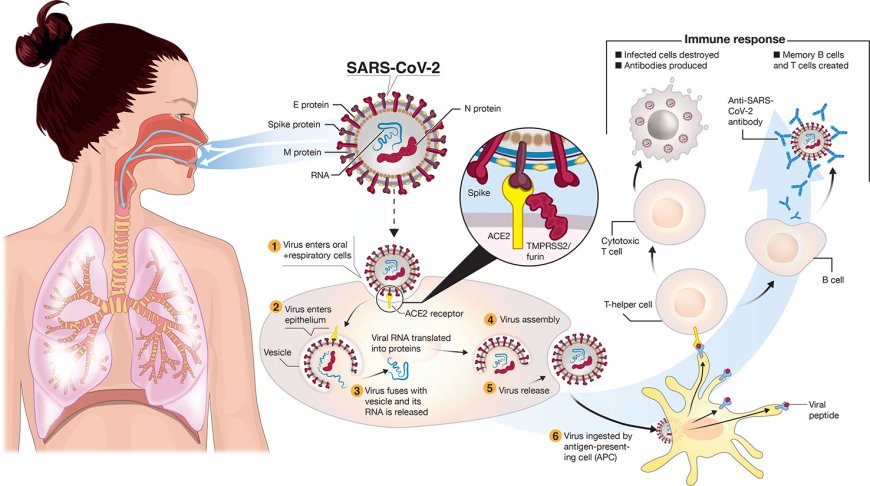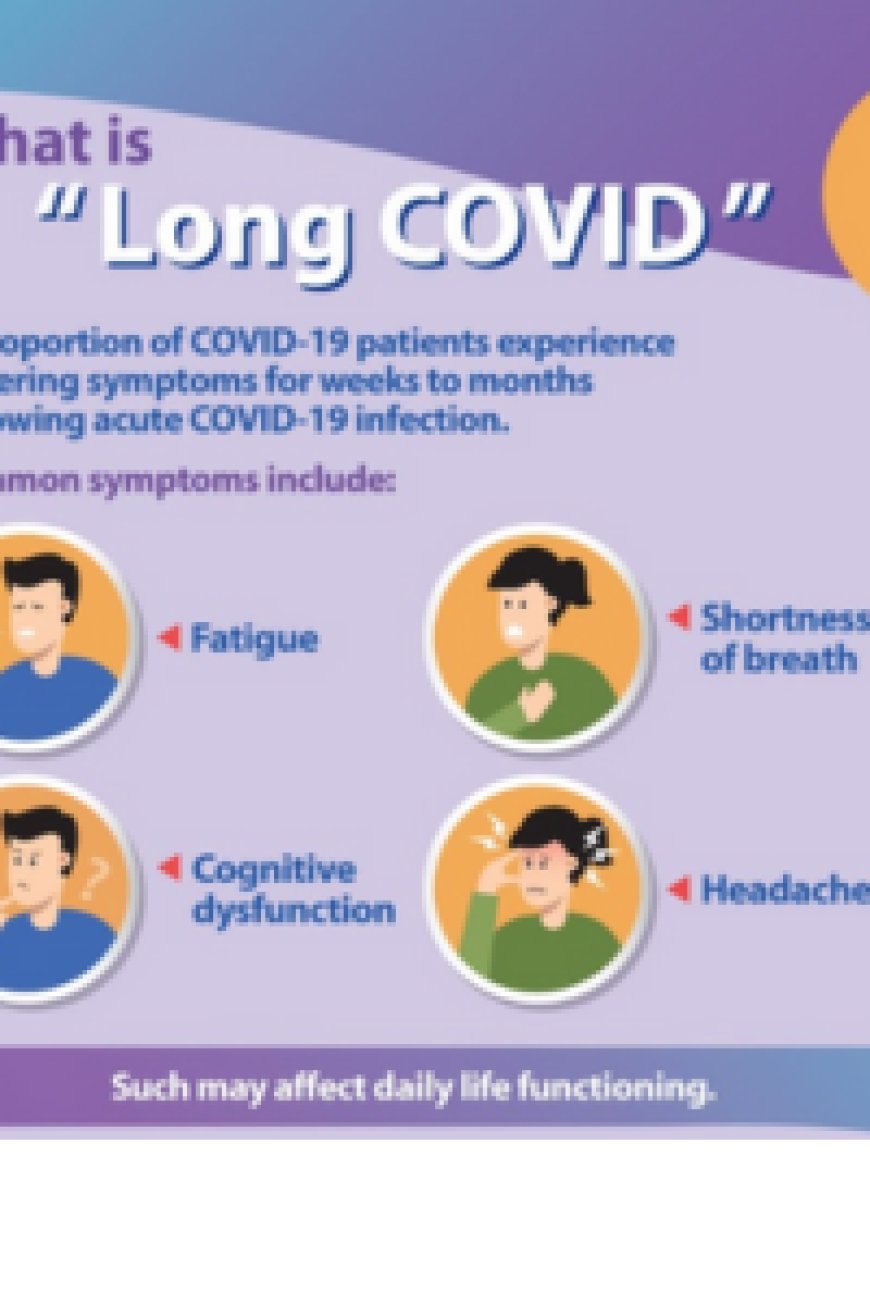"Unraveling the Long Covid Mystery: A Promising New Suspect Emerges"
"The search for answers to the baffling long-term effects of Covid-19 has led to a new suspect. Learn about the latest developments in the quest to understand Long Covid and how this new lead could help shed light on the mystery."
Long COVID, also known as post-acute sequelae of SARS-CoV-2 infection (PASC), is a condition where people who have recovered from COVID-19 continue to experience symptoms for weeks or months afterward. While the exact cause of long COVID is still unknown, researchers have been studying various potential factors.
Recently, a new suspect has emerged in the long COVID mystery: autoantibodies. Autoantibodies are antibodies produced by the immune system that target and attack a person's own tissues or organs. In the case of COVID-19, the virus may trigger the production of these autoantibodies, which could then attack healthy tissues and organs, leading to long COVID symptoms.
Several studies have found evidence of autoantibodies in people with long COVID. For example, a study published in the journal Nature Communications in April 2021 found that people with long COVID had higher levels of autoantibodies targeting various parts of the body, including the lungs, heart, and brain, compared to people who had recovered from COVID-19 without experiencing long-term symptoms.
While this new finding is still being studied, it suggests that treatments targeting autoantibodies may be effective in treating long COVID. It also highlights the importance of continued research into the underlying causes of long COVID to develop effective treatments for those who continue to suffer from its debilitating symptoms.
Other potential suspects in the long COVID mystery include viral persistence, where small amounts of the virus continue to linger in the body even after the initial infection has cleared, as well as immune dysfunction, where the immune system is unable to properly clear the virus and may continue to attack the body's own tissues.
One theory is that long COVID may be a result of a combination of these factors, including the production of autoantibodies, viral persistence, and immune dysfunction. This would suggest that a multi-pronged approach may be necessary to effectively treat long COVID, such as using antiviral therapies to target viral persistence, immunomodulatory drugs to regulate the immune response, and therapies targeting autoantibodies.
However, much more research is needed to fully understand the underlying causes of long COVID and develop effective treatments. It is also important to continue monitoring and supporting individuals who are experiencing long-term symptoms of COVID-19, as well as taking measures to prevent the spread of the virus to prevent further cases and potential long-term effects.
Complications
Long COVID can lead to a range of complications that can significantly impact a person's quality of life. Some of the most common complications of long COVID include:
- Fatigue: Prolonged fatigue and exhaustion are common symptoms of long COVID, and can impact a person's ability to carry out daily activities and work.
- Respiratory problems: Long COVID can lead to ongoing breathing difficulties, such as shortness of breath and chest pain.
- Neurological problems: Long COVID can cause neurological symptoms such as brain fog, memory loss, and difficulty concentrating.
- Cardiovascular problems: Some people with long COVID may develop heart problems, such as myocarditis or pericarditis.
- Mental health problems: Long COVID can have a significant impact on a person's mental health, including depression, anxiety, and post-traumatic stress disorder (PTSD).
- Physical deconditioning: Prolonged inactivity due to long COVID symptoms can lead to physical deconditioning, muscle loss, and decreased stamina.
- Other complications: Long COVID can also cause a range of other symptoms, including joint pain, headaches, and gastrointestinal problems.
It is important to note that not everyone who experiences long COVID will develop complications, and the severity and duration of symptoms can vary widely between individuals. However, it is crucial to monitor for potential complications and seek medical attention if needed.
Prevention
The best way to prevent long COVID is to prevent COVID-19 infection in the first place. Here are some key strategies for preventing COVID-19:
- Get vaccinated: COVID-19 vaccines are highly effective in preventing infection, severe illness, and death. It is important to get vaccinated as soon as possible when eligible.
- Wear masks: Wearing a mask in public settings, particularly when indoors or in crowded areas, can help prevent the spread of COVID-19.
- Practice physical distancing: Maintaining a distance of at least 6 feet from others can help reduce the risk of COVID-19 transmission.
- Practice good hygiene: Washing hands frequently with soap and water, or using hand sanitizer when handwashing is not possible, can help prevent the spread of COVID-19.
- Avoid large gatherings: Limiting contact with people outside of your household and avoiding large gatherings can reduce the risk of COVID-19 transmission.
It is important to continue following these prevention strategies even after getting vaccinated, as there is still a risk of breakthrough infections and transmission. By taking these measures, we can reduce the spread of COVID-19 and the risk of long COVID.
Treatment
The treatment of long COVID is still being studied, and there is currently no specific cure for the condition. However, there are several treatment options that may help manage the symptoms of long COVID:
- Symptomatic treatment: Many of the symptoms of long COVID can be managed with over-the-counter or prescription medications, such as pain relievers, anti-inflammatory drugs, and cough suppressants.
- Rehabilitation therapy: Physical and occupational therapy can help people with long COVID regain strength, flexibility, and stamina, as well as improve balance and coordination.
- Cognitive-behavioral therapy (CBT): CBT can help people with long COVID manage symptoms such as anxiety, depression, and brain fog, and improve their quality of life.
- Pulmonary rehabilitation: This type of therapy can help people with long COVID who are experiencing respiratory problems, such as shortness of breath, improve their lung function and breathing ability.
- Complementary therapies: Some people with long COVID have reported symptom relief from complementary therapies such as acupuncture, massage therapy, and yoga.
- Clinical trials: There are several ongoing clinical trials studying potential treatments for long COVID, including medications and therapies targeting autoantibodies, viral persistence, and immune dysfunction.
It is important for individuals with long COVID to work closely with their healthcare provider to develop a treatment plan tailored to their specific needs and symptoms.
Conclusion
Long COVID is a complex and ongoing medical condition that can cause a range of symptoms and complications that can significantly impact a person's quality of life. While the underlying causes of long COVID are still being studied, there is evidence to suggest that a combination of factors, including autoantibodies, viral persistence, and immune dysfunction, may contribute to the development of long COVID.
Preventing COVID-19 infection through vaccination, wearing masks, physical distancing, and good hygiene practices can help reduce the risk of long COVID. For those experiencing long COVID symptoms, there are several treatment options available, including symptomatic treatment, rehabilitation therapy, and clinical trials studying potential treatments.
It is important for individuals experiencing long COVID to seek medical attention and work closely with their healthcare provider to develop a treatment plan tailored to their specific needs. Further research is needed to fully understand the underlying causes of long COVID and develop effective treatments to improve the lives of those affected.
Files
What's Your Reaction?









































